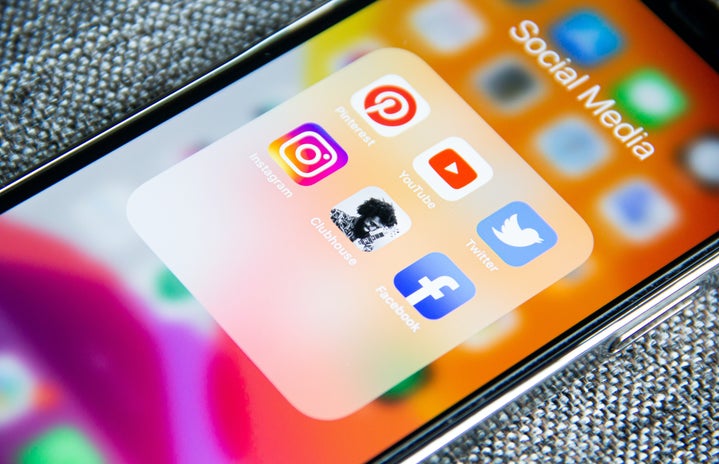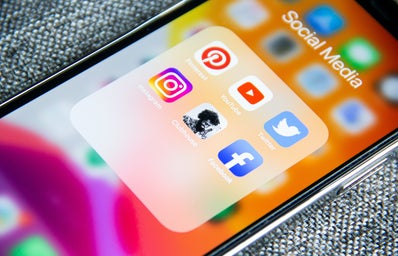About four years ago I had long bleach-blonde hair, wore a full face of make-up every day including lashes, and always had acrylic nails. There is nothing wrong with any of these things, except for the fact that it isn’t me. I had fallen victim to social media influencers’ “influence” and felt pressure to fit a certain mold. The Tummy Tea Ads were a constant reminder that my body wasn’t good enough and posts of parties and trips from friends and influencers alike made me experience some serious ‘FOMO’.
Every day we are subjected to different messaging and often times we don’t realize the subconscious effects of the content we’re consuming. It took shaving my head, therapy, and some serious soul searching for me to realize that I wasn’t living for myself but rather for the ‘likes’ and opinions of others online. To save you from an impulsive haircut and spending hundreds on therapy, I’ve created four tips that can help you remain grounded in a world fueled by social media.
- Limit your screen time
-
According to a Vox article a study suggests American adults spend about three hours and 30 minutes a day using the mobile internet in 2019. The article suggests that time has increased in 2020 and 2021, especially during the pandemic. Luckily, both iPhone and Android have a feature that allows a user to view their screen time and set time limits for apps.
Setting limits or simply being aware of screen time allows you to better utilize your time. If you’re mindlessly scrolling while at work or sitting at home, try picking up a book instead!
A few of my favorites: “The Lathe of Heaven” by Ursula K. Le Guin, “Becoming” by Michelle Obama, “Naked Human” by Christopher Pointdexter, and “The Cellist of Sarajevo” by Steven Galloway.
- stay off the phone before bed
-
According to a Huff Post article, a 2019 study indicated that 61 percent of parents are on their phone within half an hour before bed and about 70 percent of children and teens check their phones within the same time span. While young adults’ usage wasn’t mentioned, it’s safe to assume the majority of us are scrolling through Twitter, TikTok or Instagram before bed.
In the article, instructor in medicine at Harvard Medical School and associate scientist in the Division of Sleep and Circadian Disorders at Brigham and Women’s Hospital, Rebecca Robbins says screens emit a color that is close to the natural light that we have in our environment. Specifically, blue light. The blue light given off from phone screens can have the same physiological alerting effect that the sun has on the body and brain.
Blue light itself might not keep you awake, but the content you’re consuming could be. Robbins makes a good point in saying it’s impossible to control the content on our social media, despite having control of choosing who to follow/be friends with. Stressful content can keep you up at night, or cause you to mindlessly scroll.
Being phone-free two hours before bedtime allows your brain and body to decompress. These two hours can be spent preparing for the next day, or simply relaxing before bed.
My favorite ways to decompress before bed: Paint with Diamonds Kits, reading, nighttime yoga, and writing “workbooks.”
- Subscribe to affirmations
-
According to a 2015 study, self-affirmation activates brain systems associated with self-related processing and reward, and it is reinforced by future orientation. Affirmations create an increased activity in key regions of the brain’s self-processing and valuation systems when reflecting on future-oriented core values compared to everyday activities.
Affirmations have changed my perspective tremendously. I first started listening to affirmations after following Alyson Stoner on Instagram. Stoner has come a long way since being the sassy tomboy from Cheaper By the Dozen. She has written a book, continues to create content for self-healing, and has created three different affirmation albums you can purchase for a small fee of $12.99, or $4.99 each.
I recommend all three albums, but my favorite is the “I am” album. Each track is about 15 minutes long and I play “Confident” almost daily.
The phone app “I am” is a great tool I utilize. For $20 a year, personalized affirmations are sent as notifications to your phone. There’s a way to customize how many are sent a day, what type of affirmations are sent and a widget can be created so affirmations can be displayed on the home screen.
- exercise and eat healthy
-
A 2006 study indicates that exercise improves mental health by reducing anxiety, depression, and negative mood and by improving self-esteem and cognitive function. Food is fuel for your body, so what you put in your body matters.
This is not to suggest that you join a gym and workout everyday for an hour, or pick up the latest diet trend. Being mindful of what you eat and how you feel afterwards or throughout the day is a good indicator if you’re getting enough nutrients or if you should rethink meals. Personally, I can’t eat gluten, red meat, dairy and a few other things. When I made the switch and eliminated them from my diet, my anxiety and depression decreased substantially. Meals with a good source of protein, fiber and healthy fats keeps me energized and confident to conquer each day.
If exercising is not your style, incorporate more movement throughout your day. You can incorporate more movement through taking stairs instead of elevators, parking in the back of parking lots to increase steps, or stand periodically if you’re sitting for most of the day. According to a Toronto researcher, a brisk 20-minute walk each day can prevent or minimize depression.


